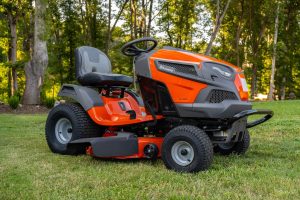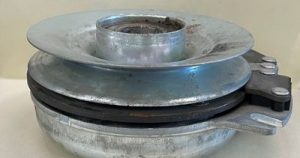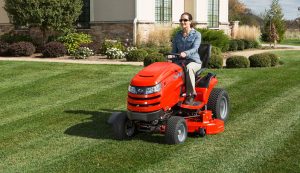Your Troy-Bilt Lawn Mower Belt Keeps Coming Off (Fixed!)
Your Troy-Bilt mower belt continues to fall off your lawn mower deck. Having to keep putting your belt back on your mower, or worse yet, having to replace it with a new belt because it keeps snapping, can get very frustrating and expensive. Finding the root cause of your belt problem is necessary so you don’t have to keep dealing with it.
A Troy-Bilt mower belt can keep coming off the mower because the belt is worn or shredded; the brackets or belt keepers are damaged; the pulley or spindle housing bearings are bad, or debris is lodged in the mower deck preventing deck components from moving.
I am going to share with you items to inspect when your Troy-Bilt belt continues to come off your mower.

This post may include affiliate links. Purchases made through these links may provide a commission for us, at no extra cost to you. As an Amazon Associate, we earn from qualifying purchases.
Follow all safety instructions provided in your equipment operator’s manual prior to diagnosing, repairing, or operating.Consult a professional if you don’t have the skills, or knowledge or are not in the condition to perform the repair safely.
Table of Contents
Reasons Your Belt Keeps Coming Off Your Troy-Bilt
- Loose or worn belt
- Belt keeper damage
- Shredded deck belt
- Bad spindle housing bearing
- Bad pulley bearing
- Worn tensioner bracket or spring
- Debris interfering with belt tension
- Debris stuck in the groove of the pulley
- Oil or rust on the belt
Loose or Worn Troy-Bilt Belt
Over time, your Troy-Bilt belt will become worn and possibly loose from normal use. When you notice the belt is loose, worn, cracked, or has a shiny glazed look to it, it is time to replace your belt with a new one.
Troy-Bilt Belt Keeper Damage
Your Troy-Bilt mower may use a belt keeper rod. This is a small rod-shaped post that sits along the side of the pulleys to help keep your belt in place.
These belt keeps sitting between 1/8” and 1/4” away from the pulley so your belt doesn’t rub against the post.
The belt keeper can become bent when a belt has slack in it and hits the keeper. With a bent belt keeper rod, the belt can come off your Troy-Bilt. You can try to bend the keeper back into place with a hammer or replace it if you are unable to reuse the keeper.
Shredded Troy-Bilt Belt
If you notice your belt appears shredded on the sides of the belt, you will need to look at your deck components to find what your belt is rubbing against.
You may find it is rubbing against a belt keeper or bracket on the deck. Another possibility for a shredded belt is your belt isn’t installed around your deck components correctly.
Take time to find to make sure your belt is routed the right way. Fix any deck components that may be out of place causing your belt to shred on the edges and come off your mower.
You want to get this resolved so you don’t continue to go through deck belts.
The deck belt is usually one of the most expensive wear parts on your mower so you don’t want to keep replacing it if you can prevent damage to the belt.
A good indication you have rubbing against a certain part of your deck is a smooth shiny area of metal. This typically is worn from the rubbing of the belt. Adjust the deck bracket to fix the problem.
If the part your belt is rubbing against happens to be a bracket with a bushing, you can sometimes replace the bushing. Other times, you will only be able to purchase the bracket and bushing as an assembly.
Damaged Bearings in Your Troy-Bilt Pulleys or Spindle Housings
Bearings in your pulleys and spindle housings can become damaged or wear over time. Failed bearings can cause your belt to come off your mower.
Inspect each pulley to make sure it is sitting flat and parallel to the deck. You don’t want one side of the pulley sitting higher off the deck than the other side.
When your pulleys don’t run flat, your belt can come off the pulley. Most of the time, the reason why your pulley doesn’t sit flat is that the bearing is bad in an idler pulley.
Idler pulleys have sealed bearings which means the whole pulley assembly will need to be replaced.
While you are checking each pulley, slowly turn the pulley and feel for any resistance. You also need to listen for noise coming from your bearing.
Replace a pulley where you feel resistance or hear a noise. This indicates the bearing is failing in your pulley.
Next, you need to check your Troy-Bilt spindle housings for bearing failure. A problem in spindle housings can cause your mower to vibrate and knock a belt off a pulley.
Before you proceed, remove the key from your ignition and unplug your spark plug boot(s) to prevent the mower from starting while working under your mower deck.
With a good pair of work gloves on, you’re going to check for spindle housing damage by grabbing a hold of each end of the mower blade. Rock the blade up and down checking for any movement.
Also, listen for a knocking sound. If you hear or feel any of these symptoms, you need to remove the spindle housings and check for a bad bearing in the housing or a bent spindle shaft.
Some spindle housings can be rebuilt while others must be purchased as an assembly.
Troy-Bilt Idler Tensioner Bracket or Spring is Worn
The tensioner bracket and spring hold the idler pulley in line. There is typically a pulley on one side of the bracket and a spring located on the other side. The spring can become worn or break causing your Troy-Bilt belt to come off your mower.
Additionally, there is a hole in the tensioner bracket where the spring is attached. The hole can wear and the vibration can cause your belt to come off. When you find either of these problems, you will need to replace the worn or missing part.
Debris Interfering with Proper Tension on Your Troy-Bilt Belt
Your owner’s manual instructs you to clean your mower deck off after mowing, but many people don’t actually do this. While mowing, your mower will kick up a lot of dust and debris such as stones, acorns, and sticks.
When debris builds up on your deck, your tension pulley is not able to move properly and can cause your belt to become loose and come off.
Another item to note that doesn’t have to do with your belt coming off but is related to safety, so it is worth mentioning is debris can catch on fire. Your belt runs fast around your pulleys causing friction and heat that can catch dry debris on fire.
So, keeping your mower deck free of debris doesn’t only help with your Troy-Bilt’s performance, it also protects your mower from damage and protects you from injury.
Check out my articles, “How to Clean Your Lawn Mower for Best Performance” and ” How to Find & Prevent Substantial Lawn Mower Deck Problems ” to learn more on how to keep your mower clean and in good condition to extend your mower’s lifespan.
Debris in the Grooves of Your Troy-Bilt Pulleys
Debris can collect in the grooves of your pulleys. The stress put on the belt because it needs to stretch around the additional debris can cause your Troy-Bilt belt to come off or snap so it is no longer usable.
Not only can debris get stuck in your pulleys, but mud can also pack around the pulleys which can cause your belt problem.
Oil or Rust on Your Troy-Bilt Belt
Your mower can develop an oil leak that drips onto your belt. Your belt can come off when it begins to slip around your pulleys.
If oil doesn’t cause your belt to come off your mower, it can cause your belt to become worn when it builds heat around the belt because it isn’t able to grab hold of the pulleys to turn them.
Rust buildup from old parts can cause damage to your mower belt. Rust will cause your belt to dry out and crack becoming more prone to breaking and coming off your Troy-Bilt.
When you find oil or rust on your belt, you need to address the oil leak or rust problem and then replace your belt. Remove rust from your pulleys by cleaning them or replacing them if they are really bad. Replace your deck belt.
In Summary
Troy-Bilt deck belts can be pricey so the longer you can make them last, the better. Here are a few items that can extend the life of your Troy-Bilt mower belt to keep it from prematurely wearing or breaking and coming off your mower:
- Clean your mower deck after each mowing to remove debris
- Check for rubbing on deck components
- Keep oil and rust from forming on your belt
- Periodically check your pulleys and spindle housings for bearing failure
- Fix or replace any damaged brackets or belt keepers
Still Experiencing Troy-Bilt Lawn Mower Problems?
Own a lawn mower long enough, you’ll start running into problems with it starting, not continuing to run, smoking, leaking gas, giving a bad cut, vibrating, or another issue.
To help you save time and money, I have put together a guide to help you troubleshoot the next problem that develops on your Troy-Bilt mower.
You can find this guide at Common Troy-Bilt Lawn Mower Problems & Solutions.
If you are unsure how to perform diagnostics and repairs on your lawn mower safely, it’s best to have a professional complete the repairs.
This will help you avoid personal injury or additional damage to the mower. Your local Troy-Bilt lawn mower dealership or lawn mower repair shop will be able to help you solve your problem.







